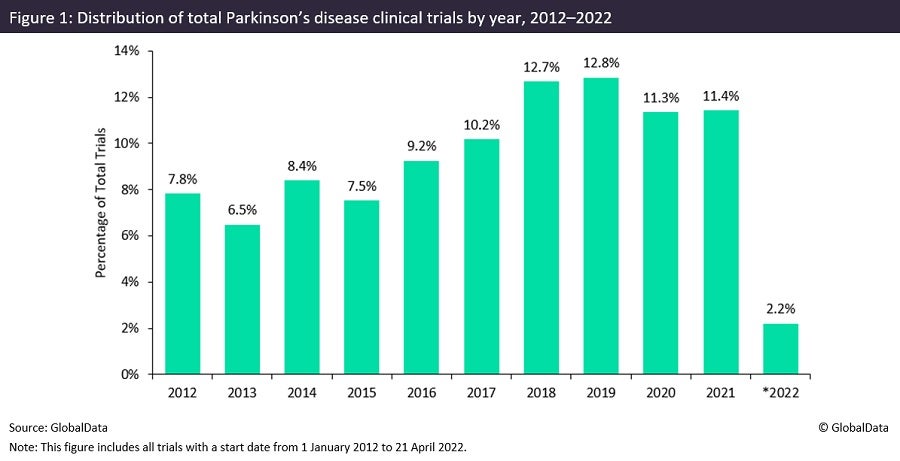Parkinson’s disease (PD) is one of the most rapidly growing neurodegenerative disorders worldwide, with the estimated prevalence set to increase by 23.2% by 2025. The disease is characterised by a loss of nerve cells in the substantia nigra, which in turn results in a substantial reduction of the neurotransmitter dopamine. As dopamine has an essential role in the regulation of movement, the physical manifestation of the disease includes motor complications such as immobility, tremors and bradykinaesia, as well as significant cognitive impairments that all result in severe comorbidities.
At present, there is no cure for PD. The majority of established PD treatments seek to alleviate symptoms and slow down progressive degeneration. This analysis investigates the PD landscape over the last ten years and examines how the research in this space has evolved.
The greatest proportion of PD studies are in Phase II of development (39.7%) followed by Phase I of development (33.9%), with Phase III and Phase IV studies holding an equal share of trials (13.2%). The majority of studies are early-phase clinical trials, highlighting the difficulty in progressing therapeutics to later phase studies. PD has a lower phase transition success rate across all phases relative to the benchmark of central nervous system (CNS) indications.
Industry-sponsored trials make up the majority of trials (54.3%) compared with their non-industry counterparts (45.7%). Notably, industry sponsorship demonstrates dominance across incurable CNS indications such as Alzheimer’s disease, where the potential to develop a first-in-market cure for a sizeable population is an attractive proposition. At present, the PD treatment landscape is focused on symptomatic relief, with dopamine receptors proving to be the leading target in ongoing studies.
The US is the most popular country for conducting clinical trials and has led trial initiations every year from 2012 to 2020. From 2017 onwards, however, a significant increase in research output was observed from China, which held second place every year from 2017 to 2020. Last year, China overtook the US for the first time in the number of trial initiations. Japan holds third place for the number of clinical trials, followed by Germany and the UK.
As shown in Figure 1, the level of research geared towards PD has been steadily increasing over the last decade, with 2019 (12.8%) proving to be the leading year during this period. The greatest single year showing a rise in trial initiations was observed between 2017 and 2018 (+2.5%). Despite this, the proportion of trial initiations decreased due to the Covid-19 pandemic from 2019 to 2020 (-1.5%), with no significant gains evident from 2020 to last year. This can be primarily attributed to the numerous disruptive effects of the pandemic on conducting clinical trials.

US Tariffs are shifting - will you react or anticipate?
Don’t let policy changes catch you off guard. Stay proactive with real-time data and expert analysis.
By GlobalDataDuring the pandemic, sponsors implemented a more decentralised approach across most therapy areas, with more remote trial setups and an increased use of virtual technologies to mitigate the pandemic’s disruptive effects. Nonetheless, the pandemic has not rapidly accelerated the level of decentralised PD studies, as the number of decentralised/virtual studies fell from 2019 to 2020 and only matched the 2019 figures last year. Generally, PD studies may not be well-suited to a decentralised approach compared with cognitive impairment disorders, due to PD patients requiring continuous visits to a hospital or clinical setting to assess changes in motor functions when therapeutics are administered. Because of this, a significant increase in decentralised studies is yet to be observed.






